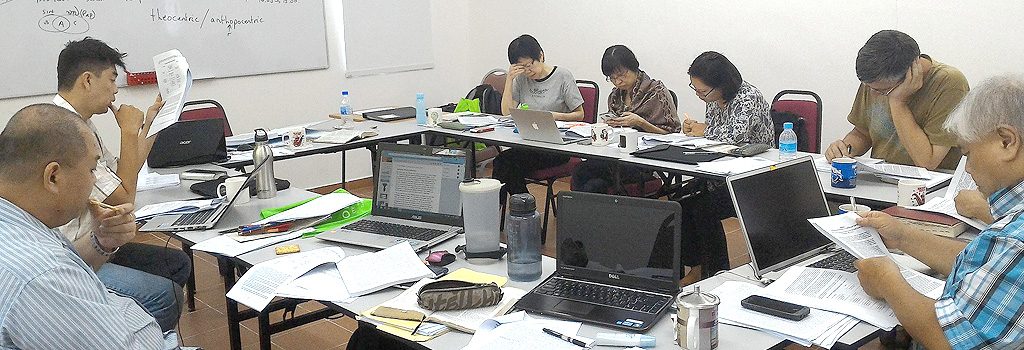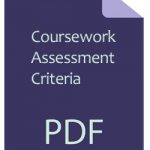
The criteria for assessment in AGST Alliance’s programs are summarised here.
- Coursework: MTh/ Postgraduate Diploma, EdD, and DMin
- Dissertation: EdD/ DMin/ PhD
- Practicum: MTh(Edn)
- Critical Engagement Project: EdD
A. Coursework: MTh/ Postgraduate Diploma, EdD, and DMin
Typically, six main areas are considered when work is assessed for higher education programs. These categories and the following criteria have been adapted from R. Ackroyd and D. Major, Shaping the tools: Study Skills in Theology, London: Dartman, Longman & Todd, 1999.
1. Evidence of knowledge & understanding of the subject and/or texts
To what extent does the assignment demonstrate breadth of knowledge, coverage of the topic, depth of understanding of issues, accuracy of information?
2. Evidence of reading and use of other appropriate resources
To what extent does the assignment show appropriate use of relevant, well-chosen and both classic and up-to-date literature and/or other source material, and an appropriate and accurate method of referencing?
3. Quality of critical analysis and interpretation
To what extent does the assignment demonstrate the ability to identify and analyse underlying issues, problems and questions and relate these to one another; to evaluate arguments and the evidence for them and examine their implications; to identify and to evaluate different perspectives?
4. Quality of argument and structure (planning) of the assignment
To what extent does the assignment answer the question in a dear and direct way; form a coherent argument; develop in a logical and convincing way, relating the introduction to the conclusion?
5. Evidence of critical reflection, personal or ministerial application
To what extent does the assignment demonstrate critical reflection on evaluation of personal and/or ministerial practice?
6. Quality of communication skills and presentation
To what extent does the assignment reflect appropriate standards and academic conventions in relation to the mode of presentation, including clarity of expression, spelling, grammar and syntax, referencing and bibliography?

B. Dissertation: EdD/ DMin/ PhD
- Awarded with distinction: The dissertation fulfils the requirements of an AGST Alliance EdD/ DMin/ PhD, and the originality of the research and the quality of presentation is significantly superior in demonstrating the criteria for an acceptable AGST Alliance EdD/ DMin/ PhD (as outlined in the PhD/EdD Handbooks).
- Awarded: The dissertation fulfils the requirements of an AGST Alliance EdD/ DMin/ PhD, and the originality of the research and the quality of presentation adequately demonstrate the criteria for an acceptable AGST Alliance PhD/EdD (as outlined in the EdD/ DMin/ PhD Handbooks).
- Fail: The dissertation fails to fulfil the requirements of an AGST Alliance EdD/ DMin/ PhD, and the originality of the research and the quality of presentation fails to demonstrate the criteria for an acceptable AGST Alliance PhD/EdD (as outlined in the EdD/ DMin/ PhD Handbooks).
C. Practicum: MTh(Ed)
The practicum, as a multi-faceted reflective, applied component of the MTh(Ed), cannot be assessed readily using the normal criteria for our MTh programs. A significant feature of the assessment challenge for the practicum is that the interaction between the students and their mentor-coaches is not able to be controlled by AGST Alliance. But the student and mentor-coach comments do provide an indicator of the students’ growth in the agreed areas of the practicum process. Hence, the MTh(Ed) practicum is graded on this scale:
- Highly satisfactory (HS): Overall, achievement and performance across the range of assessment components demonstrates a higher than expected level of skills for a competent educational facilitator in a Christian faith community setting.
- Satisfactory (S): Overall, achievement and performance across the range of assessment components demonstrates adequately the skills required by a competent educational facilitator in a Christian faith community setting.
- Unsatisfactory (US): Overall, a deficient or uneven level of performance and achievement across the range of assessment components for a competent educational facilitator in a Christian faith community setting.
D. Critical Engagement Project: EdD
The critical engagement project, as a multi-faceted critically reflective and creatively applied component of the EdD cannot be assessed readily using the normal criteria for EdD coursework. A significant feature of the assessment challenge for the project is that the interaction between the candidates and their mentor-coaches is not able to be controlled by AGST Alliance. But the candidate and mentor-coach comments do provide an indicator of the candidates’ growth in the agreed areas of the project process. Hence, the EdD critical engagement project is graded on this scale:
- Highly satisfactory (HS): Overall, achievement and performance across the range of assessment components demonstrates a higher than expected level of critically reflective and applied skills necessary for a professional senior leader/trainer.
- Satisfactory (S): Overall, achievement and performance across the range of assessment components demonstrates adequately the critically reflective and applied skills necessary for a professional senior leader/trainer.
- Unsatisfactory (US): Overall, a deficient or uneven level of performance and achievement across the range of assessment components for a critically reflective professional senior leader/trainer.
